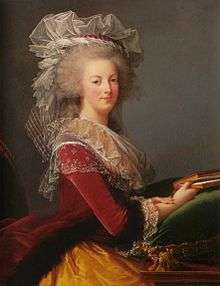
It is quite certain that in seeing the people who treat us so well despite their own misfortune, we are more obliged than ever to work hard for their happiness.
Marie Antoinette (November 2 1755 – October 16 1793) was Queen of France and Archduchess of Austria. She was the daughter of the Holy Roman Emperor Francis I and his wife Maria Theresa of Austria, the wife of Louis XVI, and the mother of Louis XVII. She was guillotined during the French Revolution. She was born Archduchess Maria Antonia Josepha Johanna of the Habsburg dynasty.
Quotes
- It is quite certain that in seeing the people who treat us so well despite their own misfortune, we are more obliged than ever to work hard for their happiness. The king seems to understand this truth; as for myself, I know that in my whole life (even if I live for a hundred years) I shall never forget the day of the coronation.
- After learning of the bread shortages that were occurring in Paris at the time of Louis XVI's coronation in Rheims, as quoted in Marie Antoinette: The Journey (2001) by Antonia Fraser, p. 135 ISBN 0307277747 . Tradition persists that Marie Antoinette joked "Let them eat cake!" (Qu'ils mangent de la brioche.) This phrase, however, occurs in a passage of Jean-Jacques Rousseau's Confessions, written in 1766, when Marie Antoinette was 11 years old and four years before her marriage to Louis XVI. Cf. The Straight Dope, "On Language" by William Safire at The New York Times, and in the discussions at Google groups.
- We had a beautiful dream and that was all. The interest of my son is the only guide I have, and whatever happiness I could achieve by being free of this place I cannot consent to separate my self from him. I could not have any pleasure in the world if I abandoned my children.I do not even have any regrets.
- Marie Antoinette to the Chevalier Jarjayes on his persuading her to escape alone from the Tower; Lettres, II. p. 433; also quoted in Marie Antoinette: The Journey (2001) by Antonia Fraser, ISBN 0307277747.
- Courage! I have shown it for years; think you I shall lose it at the moment when my sufferings are to end?
- Responding to the priest who had accompanied her to the foot of the guillotine, who had whispered, "Courage, madame! Now is the time for courage." Quoted in Women of Beauty and Heroism (1859) by Frank B. Goodrich, p. 301.
- Variant translations:
- Courage! The moment when my ills are going to end is not the moment when courage is going to fail me.
- To the juror, Abbé Girard, shortly before her death, quoted in Marie-Antoinette a la Conciergerie (du ler août au 16 octobre 1793) 2nd edition (1864) by M. Émile Campardon
- Courage? The moment when my troubles are going to end is not the moment when my courage is going to fail me.
- As quoted in Marie Antoinette (2008) by Jane Bingham, p. 39
- Madame d'Adhémar, here is another missive from my unknown. Have you not heard people talking again of the Comte de St.--Germain?... This time, the oracle has used the language which becomes him, the epistle is in verse; it may be bad, but it is not very cheering. You shall read it at your leisure...The unknown says the same as you do; but who is wrong or right?'
- Quoted in: The Count of St. Germain: Mystic and Philosopher, Ch IV, Tragical Prophecies, p 78, Isabel Cooper-Oakley ISBN 1-4253-3280-3. (1912)
- What do you make of these threatening verses?... Pray heaven you speak truly, Madame d’Adhémar, however, these are strange experiences. Who is this personage who has taken an interest in me for so many years without making himself known, without seeking any reward, and who yet has always told me the truth? He now warns me of the overthrow of everything that exists and, if he gives a gleam of hope, it is so distant that I may not reach it... You fancy that I possess credit or power in our Salon. You are mistaken; I had the misfortune to believe that a Queen was permitted to have friends. The consequence is that all try to rule me, or to use me for their own personal advantage. I am the centre of a crowd of intrigues, which I have difficulty in avoiding.
- Comments made to Gabrielle Pauline d'Adhémar, regarding a missive by Comte de St.--Germain in 1788. The Count of St. Germain: Mystic and Philosopher, Ch IV, Tragical Prophecies, p 79/80, Isabel Cooper-Oakley ISBN 1-4253-3280-3. (1912)
About Marie Antoinette
- [Her] rumored tribadism had historically specific political implications. Consider her final (fictive) testimony in The Confession of Marie-Antoinette: 'People!' she protests, 'because I ceded to the sweet impressions of nature, and in imitating the charming weakness of all the women of the court of France, I surrendered to the sweet impulsion of love...you hold me, as it were, captive within your walls?'"
- Dena Goodman (2003). Marie-Antoinette: writings on the body of a queen. Psychology Press. pp. 144–145. ISBN 0-415-93395-1. Retrieved February 19, 2012.
External links
- Memoirs Of The Court Of Marie Antoinette, Queen Of France - Memoirs of Madam Campan, First Lady in Waiting to the Queen
This article is issued from
Wikiquote.
The text is licensed under Creative
Commons - Attribution - Sharealike.
Additional terms may apply for the media files.